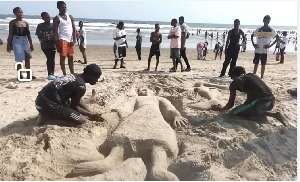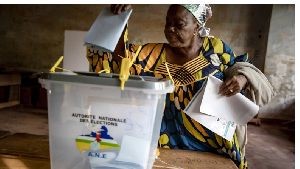Accra, Aug. 17, GNA - Lieutenant Col. Larry Gbevlo-Lartey (Rtd), National Security Co-ordinator, on Monday noted that security, governance and
management issues were multi-dimensional and should therefore not be left on the shoulders of the security services alone. Addressing the opening ceremony of the Sixth Security Sector Governance and Management course at the Ghana Armed Forces Command and Staff
College in Accra, Lt Col. Gbevlo-Lartey said: "We are all stuck together as team players and the ability of the security services relies heavily on the decisions,
timely responses and the input of other stakeholders." These stakeholders, he said, include the ministries, department, agencies, the citizenry, private sector and members of parliament. Lt Col. Gbevlo-Lartey whose speech was read by Mr Kosivi Degbor, Deputy National Security Co-ordinator, said security was everybody's business,
adding a threat to the nation was not a threat only to the security sector but "it is a threat to all of us". Participants were drawn from 28 government agencies including the Office of the President, Ghana Armed Forces (GAF), Ghana Police Service, Ghana
Prison Service, Ghana National Fire Service, Judicial Service, Ghana Journalists Association, National Media Commission and other government agencies. The course is expected to identify security priorities and threats of the country and recommendations for tackling them. It was sponsored by the Government in collaboration with the University of Ghana, Ghana Institute of Management and Public Administration (GIMPA),
Africa Security Dialogue and Research and the GAF. Outlining the perspective of the National Security Council, he said security issues in modern times were more on human security in the context of global
interconnectedness. This, according to him, was in contrast to employment of the security sector for regime security. "Today's security orientation focuses on the responsibility of the security services to protect the rights of the citizens and foreign guests to a reliably safe,
peaceful and productive livelihood," he said. Lt. Col. Gbevlo-Lartey said security was not only concerned with the core function of preventing subversion, sabotage, terrorism and crimes but also help
the nation achieve its developmental goals and good governance. He said it also entailed the protection of the integrity of the territory of the country, the Constitution and other regulations as well as the processes and
procedures prescribed by them. A few moths ago, he said, heavy traffic at the Tetteh Quarshie Interchange in the mornings was considered a threat to the peace of mind and the
productivity of the users of that road, adding that in the interest of human security it became a priority security issue. Lt. Col. Gbevlo-Lartey said in solving this security problem, many agencies, ministries, the security sector and other institutions were all involved in the
planning and execution of a project in reducing that frustration through construction work. He said Ghanaians in recent times were faced by issues such as armed robbery, cyber fraud, sanitation, proliferation of small arms, chieftaincy, land
disputes and road accidents all of which bordered on security and should be discussed in small groups at the course. Lt. Col. Gbevlo-Lartey said overcoming these challenges required a clear strategic direction, articulated within an appropriate policy framework. Major General Kwesi Yankson, Commandant of the Ghana Armed Forces Command and Staff College told the participants that people would rely on them
to make their work places strong and more effective in dealing with security related issues. He said participants should put what they learn into practice and share their knowledge with their colleagues.
General News of Monday, 17 August 2009
Source: GNA












